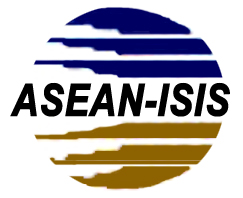The Board of Trustees is proud to announce that Asia Pacific Pathways to Progress Foundation has become the Philippine member of the ASEAN Institutes for Strategic and International Studies (ASEAN-ISIS). Long-time observers of Asia Pacific regional affairs know ASEAN-ISIS as an indispensable network of think tanks from across Southeast Asia that has tirelessly injected policy ideas and advocacies for consideration of governments in the region. Pathways takes over the Philippine representation from the Institute for Strategic and Development Studies (ISDS), and hopes to continue the decades-long distinguished record of performance of ISDS under the indefatigable leadership of Prof Carolina Hernandez.
Among the prominent activities of ASEAN-ISIS are the Asia Pacific Roundtable for Confidence Building and Conflict Resolution (APR) held annually in Kuala Lumpur and organized by the ISIS Malaysia, an ASEAN-ISIS-IIR Taiwan Dialogue, an ASEAN-ISIS-Australia-New Zealand Dialogue, and participation in the Council for Security Cooperation in the Asia Pacific. In the past, it also played a major role in pushing the regional human rights agenda and civil society participation through the ASEAN-ISIS Colloquium on Human Rights (AICOHR), and the ASEAN People’s Assembly (APA).
In 2003, Japanese scholar Hiro Katsumata wrote that “… ASEAN‐ISIS has contributed to the establishment of the ASEAN Regional Forum (ARF) by analysing the common/cooperative security thinking, the establishment of an inter‐governmental forum for a security dialogue, and the extension of ASEAN's diplomatic style over a larger geographical area.”
Diane Stone of the University of Warwick, had this to say about ASEAN-ISIS in 2013:
“As ‘wholly active citizens’, ASEAN-ISIS institutes performed three important tasks. Firstly, they acted as innovators by providing new policy ideas about economic or security cooperation at the regional level. Secondly, they broadcast these ideas and their policy recommendations and started the ball rolling for a ‘habit of dialogue’ (Sukma, 2006: 89). Thirdly, through their networking, joint research and other collaborative ventures intra-regionally, and for some through their involvement in the political processes of their home states, the institutes helped shape the political choices made by state elites. “
Following the decision of the ASEAN-ISIS member institutes at its meeting on May 7, 2018 in Kuala Lumpur, ASEAN-ISIS is now composed of the following organizations:
Brunei Darussalam Institute of Policy and Strategic Studies (BDIPSS)
Cambodian Institute for Cooperation & Peace (CICP)

Centre for Strategic and International Studies (CSIS Indonesia)
Institute of Foreign Affairs (IFA) Lao People's Democratic Republic
Institute of Strategic and International Studies (ISIS) Malaysia
Myanmar Institute of Strategic and International Studies (MISIS)
Asia Pacific Pathways to Progress Foundation (Philippines)
Singapore Institute of International Affairs (SIIA Singapore)
The Institute of Security and International Studies (ISIS Thailand)
Diplomatic Academy of Vietnam
The Centre for Strategic and International Studies in Jakarta serves as the Secretariat.
